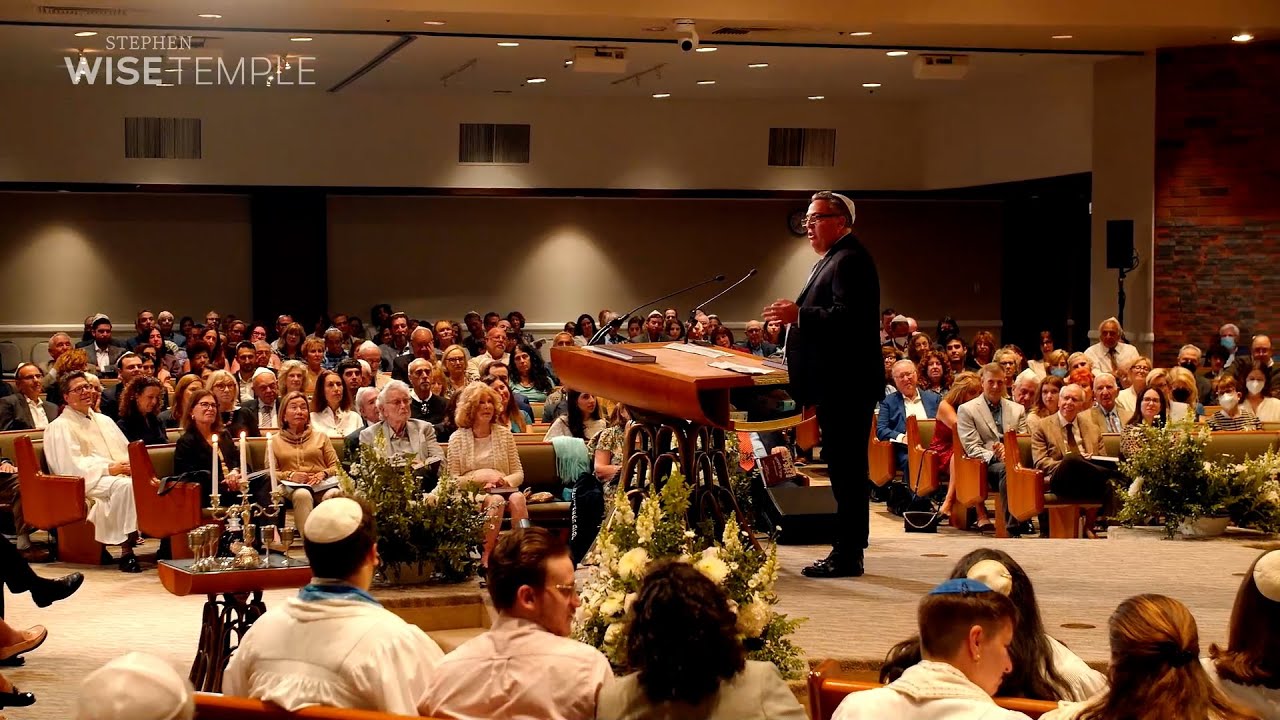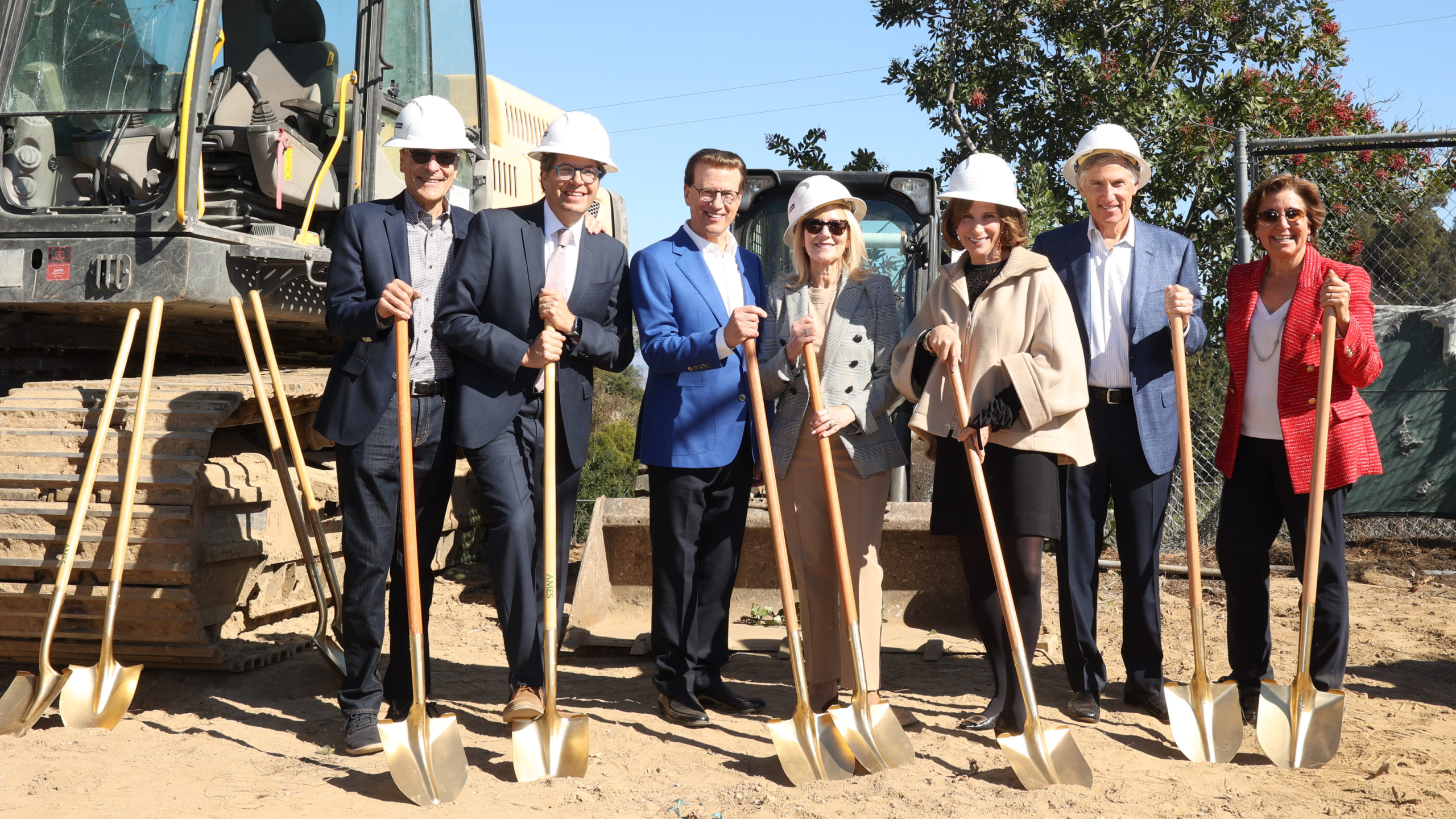Senior Rabbi Emeritus Eli Herscher and Milken Community Schools Past President Metuka Benjamin Remember A Leader, Colleague, and Friend
By Harvey Kubernik
The much-revered founder and moral visionary behind Stephen Wise Temple, Rabbi Isaiah Zeldin, died at the prodigious age of 97, on January 26, 2018.
Rabbi Zeldin was a renowned educator and thinker whose formidable intellect was tempered by a gentle, judicious soul. His pioneering innovations within the Reform Judaism community established him as a clarion voice, a visionary with a savvy business acumen that continues to enrich Wise’s mission to serve clergy, congregants, students, and faculty, from childhood to journey’s end.
The son of a Talmudic scholar and ardent Zionist, the Bronx-born Zeldin found his life’s path early on. In 1954, he relocated to Los Angeles, establishing the California branch of Hebrew Union College. From 1958 through 1963 Rabbi Zeldin served as the spiritual leader of Temple Emanuel of Beverly Hills.
 In 1964, Zeldin and his wife Florence joined with 35 other families to found Stephen Wise Temple. Friends and associates knew him as “Shy,” derived from Yeshayahu, the Hebrew name for Isaiah. Devoted insiders would eventually refer to the 18-acre campus adjacent to the Sepulveda Pass as “Mount Shynai,” a fitting tribute to Zeldin’s inspired leadership.
In 1964, Zeldin and his wife Florence joined with 35 other families to found Stephen Wise Temple. Friends and associates knew him as “Shy,” derived from Yeshayahu, the Hebrew name for Isaiah. Devoted insiders would eventually refer to the 18-acre campus adjacent to the Sepulveda Pass as “Mount Shynai,” a fitting tribute to Zeldin’s inspired leadership.
In the Jewish Journal’s obituary for Rabbi Zeldin, Stephen Wise Temple Senior Rabbi Yoshi Zweiback cited “Zeldin’s impact on the lives of so many members of our community… what he did for our congregation, for the Los Angeles community, and, more broadly, for the Jewish people, was truly extraordinary.”
One of Zeldin’s closest collaborators for half a century was Tel Aviv native Metuka Benjamin, who holds a master’s degree in education from Jewish Theological Seminary. In 1964 she joined Rabbi Zeldin in sharing his passion and educational vision for Wise.
Metuka was a witness and active participant in every step of the development and growth of the Stephen Wise Temple dream. Ms. Benjamin was a prime mover in inaugurating an extensive day school system in a Reform Jewish setting. She was present for the initial construction of buildings that now house Wise’s early childhood program, elementary school, and adult educational classrooms.
“In 1964 I sat down with Rabbi Zeldin, took a vow, and then we started to talk about the plans and vision and what is going to happen,” remembered Ms. Benjamin. “At the time they didn’t have the site. It was a church.
 “He and the businessmen and the real estate developers really worked. The Hershenson family was extremely committed. Rabbi Zeldin and his wife Florence were a team. She was right by his side and very devoted. He had the knowledge to work with committees and involve them, but in the end it was the way he wanted it and they accepted it without any fighting,” Metuka underscored.
“He and the businessmen and the real estate developers really worked. The Hershenson family was extremely committed. Rabbi Zeldin and his wife Florence were a team. She was right by his side and very devoted. He had the knowledge to work with committees and involve them, but in the end it was the way he wanted it and they accepted it without any fighting,” Metuka underscored.
“The groundbreaking of the land was very moving, because until then we didn’t have a site. We were operating from various places. The office was on Beverly Drive with services at a church. The school was at Leo Baeck Temple,” she reminisced.
“Rabbi Zeldin understood and knew if you want Jewish continuity you have to have a school. As for fund raising and building the vision, and what he wanted to build, he believed very strongly in what he was doing,” Ms. Benjamin stated. “And that was his agenda. He had the ability to convey it to whoever he talked too. He could educate them about how important this was, and excited, because he himself was excited. Believe in your heart and your head.
“On the bima Rabbi Zeldin was very charismatic. He was also a workaholic. He sat down and he made phone calls and he was very personable. If Rabbi Zeldin had a philosophy it was to take calculated risks. Not foolish risks. In most cases he was accurate.
“When we started the day camp,” disclosed Ms. Benjamin, “Rabbi Zeldin drove the bus to Wise’s camp. On field trips he drove us to the beach. On the beach he interacted with the kids like he was the camp counselor. He was a hands-on boss. He picked up stray pieces of trash on campus,” marveled Metuka.
“Stephen Wise Temple was his vision,” declared Rabbi Eli Herscher, who was ordained in 1975 and was invited by Rabbi Zeldin to serve as his associate rabbi at Wise that same year. In 1990, Rabbi Herscher became Senior Rabbi of the congregation, a position he held until 2015, at which time he became Senior Rabbi Emeritus.
“He was a hard-working man and he worked day and night,” said Herscher. “However, Rabbi Zeldin had this group of people that I can tell you, the commitment from these people was priceless. And because he felt that way about Metuka, and became aware of her ability, once he saw that, he pretty much gave freedom. And that’s what I enjoyed above anything else. Once he trusted us, and he knew what we were doing, he didn’t breathe down our necks. It’s an important issue.
“Rabbi Zeldin built the congregation. He had a vision on how to do it. He had peoples’ trust and they knew if they contributed that he would bring it home. It all got done,” Rabbi Herscher reinforced.
“The saying that he shared a few times with me was, ‘Eli. He who pays the piper calls the tunes.’ He saw himself as paying the piper and he called the tunes,” revealed Rabbi Herscher.
 After the construction of Hershenson Hall in 1968, Tthe Wise campus would continue to grow and eventually include a swimming pool, leading to a well-known identifier: Wise became the “shul with a pool.”
After the construction of Hershenson Hall in 1968, Tthe Wise campus would continue to grow and eventually include a swimming pool, leading to a well-known identifier: Wise became the “shul with a pool.”
“Why a shul with a pool?” reflected Rabbi Herscher. “The swimming pool was not about being able to brag about having a swimming pool; it was about ‘will it bring Jewish kids? Will it bring their parents?’ It was created before the day school and used only on weekends. Then we have a day school. Then it becomes part of the PE program. And then there’s a swim team. Then there’s a full-time director of that program.”
Rabbi Zeldin never knew when he got the initial monies for the pool that one day there would be an aquatic team. But the fact that he was willing to explore new ideas to bring people into the community is a testament to his creativity in building the Wise campus and legacy.
Of course, the growth wouldn’t end there. Once there was an elementary school, a high school was the next logical step.
“The high school started because there was a need in the city for a Jewish high school higher education,” Benjamin said. “It started at the Wise facility with the middle school and it didn’t make it in terms of enrollment. Parents said to Rabbi Zeldin, ‘If you had a high school we would continue on.’ We went very quickly into it.
“On the academic curriculum we worked with consultants. You know, there is a price to be paid when you do anything too fast. The high school took time. And it still takes time to have the committed people for the right reasons for high school education.”
Parents didn’t just need higher ed for their teenagers—there was also an opportunity to bring in the youngest among the community for parenting classes to help connect young families.
“We had the first Parenting Center in the community,” Ms. Benjamin proudly states. “Two ladies, Marilyn Brown and Norma Freeman came up with the idea and they went to speak to Rabbi Zeldin about it.
“He said ‘go for it.’ He knew right away that we would gain members and kids in the school. He always looked ahead, not just at the immediate thing. He was fiscally very responsible. He took calculated risks. He knew taking foolish risks could end the enterprise.”
Clearly, the Parenting Center was anything but foolish. Today, the Parenting Center hosts regular grandparent-and-me classes: many of the grandparents were part of those original parent-and-me classes decades ago.
Rabbi Herscher remembers asking Rabbi Zeldin if he had ever imagined all of this immense growth, what the Wise community and campus would become. “‘Are you kidding, Eli?,’ he told me. ‘No, I didn’t know what we would have or would be what we are.’ When Metuka said he worked night and day that was not an exaggeration. I think he had a work ethic like no Rabbi I know.”
“Rabbi Zeldin never hesitated at any time to roll up his sleeves and move chairs and tables,” mused Ms. Benjamin. “Or pick up a broom. I give this man a lot of credit for the risks and doing all these things.
“And he also had people like Rabbi Herscher, who he fully trusted and cared for and respected greatly, and me, in the school, doing what I was doing. And we sat down and also learned from him,” she expounded.
“He was an excellent teacher. He was presenting a model for us—we were learning and grabbing every opportunity.
 “I think both Eli and I derived a great deal from him. There was no one like him who turned a vision into reality. There was also something so beautiful that I saw in him,” Metuka proclaimed. “And, Rabbi Herscher has the same quality as a leader: they believed they were part of the crowd and didn’t place themselves on a pedestal.’”
“I think both Eli and I derived a great deal from him. There was no one like him who turned a vision into reality. There was also something so beautiful that I saw in him,” Metuka proclaimed. “And, Rabbi Herscher has the same quality as a leader: they believed they were part of the crowd and didn’t place themselves on a pedestal.’”
“When you think about the number of kids and their parents who went through the schools or who are going through the schools now, that’s huge impact,” Rabbi Herscher stated. “That is what he would talk about: the Jewish future. He was a lover of the Jewish people, Judaism, and Israel. They were all one for him. He was concerned about the future of Jewish life in America and of Israel. And here he knew the difference he could make.
“At age 13 he knew what he wanted to become. In some of the last conversations I had with him at his home in the Palm Desert he talked about his great-grandchildren. What drove him in terms of Jewish future—he had achieved it,” concluded Rabbi Eli Herscher.
“His legacy, influence, and impact. It is seen every day,” summarized Metuka Benjamin. “For Rabbi Herscher and me it is such a great satisfaction to see that Wise has made such an impact on so many.”
Harvey Kubernik is an author of 15 books and has penned the liner note booklets to the compact disc releases of Carole King’s Tapestry, Elvis Presley The ’68 Comeback Special, The Ramones’ End of the Century and Allen Ginsberg’s Kaddish.


